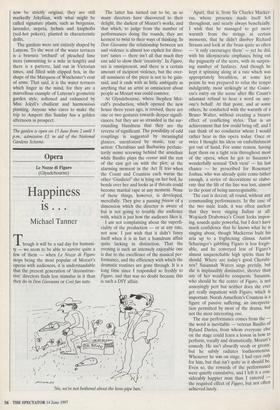Opera
Le Nozze di Figaro (Glyndebourne)
Happiness is . .
Michael Tanner
Though it will be a sad day for humani- ty — we seem to be able to survive quite a few of them — when Le Nozze di Figaro stops being the most popular of Mozart's operas with audiences, it is understandable that the present generation of 'cleconstruc- five' directors finds less stimulus in it than they do in Don Giovanni or Cosi fan tutte. The latter has turned out to be, as so many directors have discovered to their delight, the darkest of Mozart's works, and that which, to judge from the number of performances doing the rounds, they are keenest to twist to their ways of thinking. In Don Giovanni the relationship between sex and violence is almost too explicit for direc- tors' tastes — there isn't all that much they can add to show their 'creativity'. In Figaro, sex is omnipresent, and there is a certain amount of incipient violence, but the over- all sunniness of the piece is not to be gain- said, and it ends with as little ambiguity as anything that an artist as omniscient about people as Mozart was could contrive.
At Glyndebourne, where Stephen Met- calf's production, which opened the new house three years ago, is revived, there are one or two gestures towards deeper signifi- cances, but they are so stranded in the sur- rounding blandness that they are the reverse of significant. The possibility of odd couplings is suggested by meaningful glances, unenforced by music, text or action: Cherubino and Barbarina perfunc- torily mime screwing behind the armchair while Basilio plays the voyeur and the rest of the cast get on with the plot; at the alarming moment in the Act II trio when the Count and Countess each warns the other `Giudizio !' she is lying on her bed, he bends over her and looks as if threats could become marital rape at any moment. None of these things, however, is developed, mercifully. They give a passing frisson of a dimension which the director is aware of but is not going to trouble the audience with, which is just how the audience likes it.
I am not complaining about the superfi- ciality of the production — or at any rate, not now. I just wish that it didn't fancy itself when it is in fact a humdrum affair quite lacking in distinction. That the evening is such an intensely enjoyable one is due to the excellence of the musical per- formance, and the efficiency with which the dramatic routines are gone through. It is a long time since I responded so freshly to Figaro, and that was no doubt because this is such a DIY affair.
`No, we're not bothered about the hose-pipe ban.'
Apart, that is, from Sir Charles Macker- ras, whose presence made itself felt throughout, and nearly always beneficially. I wish that he managed to get more warmth from the strings at certain moments, that he didn't disobey Richard Strauss and look at the brass quite so often — 'it only encourages them' — yet he did, with his idiosyncratic emphases, bring out the pugnacity of the score, with its surpris- ing number of fanfares. And though he kept it spinning along at a rate which was appropriately breathless, at some key points he was prepared to relax the tempo indulgently, most strikingly at the Count- ess's entry on the scene after the Count's adamant refusal to hear a word on any- one's behalf. At that point, and at some others, he conducted with the warmth of a Bruno Walter, without creating a bizarre effect of conflicting styles. That is an achievement that few could bring off, and I can think of no conductor whom I would rather hear in this opera today. Once or twice I thought his ideas on embellishment got out of hand. For some reason, having kept them on a tight rein throughout most of the opera, when he got to Susanna's wonderfully sensual `Deh vieni' — his last chance — he prescribed for Rosemary Joshua, who was already quite come-hither enough, a series of decorations so elabo- rate that the lilt of the line was lost, almost to the point of being unrecognisable.
The cast is decent, all round, without any commanding performances. In the case of the two male leads, it was often unclear that they were singing Italian at all: Wojoiech Drabowicz's Count looks impos- ing, sounds quite powerful, but I don't have much confidence that he knows what he is singing about, though Mackerras built his aria up to a frightening climax. Anton Scharinger's gabbling Figaro is less forgiv- able, and he conveyed less of Figaro's almost unquenchable high spirits than he should. Where are today's good Cherubi- nos? Susannah Waters sings prettily, but she is implausibly diminutive, shorter than any of her would-be conquests. Susanna, who should be the centre of Figaro, is not annoyingly pert but neither does she ever get really impatient with Figaro, which is important. Norah Amsellem's Countess is a figure of passive suffering, an interpreta- tion permitted by most of the drama, but not the most interesting one.
The star performance comes from the the word is inevitable — veteran Basilio of Ryland Davies, from whom everyone else on the stage could learn a lesson in how to perform, vocally and dramatically, Mozart's comedy. He isn't absurdly seedy or greasy, but he subtly radiates loathsomeness. Whenever he was on stage, I had eyes only for him, but that isn't quite as it should be. Even so, the rewards of the performance were quietly cumulative, and I left it a con- siderably happier man than I entered — the required effect of Figaro, but not often achieved lately.










































































 Previous page
Previous page